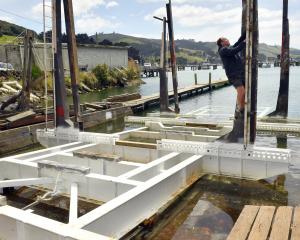Sales were up in several sectors and countries, in-house controlled manufacturing in Dunedin was beginning to make commercial headway and numerous international product trials were showing positive results.
While the company was not quite running to budget so far this year, Blis chief executive Dr Barry Richardson reiterated he expected revenue to double this year to about $2.5 million and that Blis would be ''near breakeven'' for the current financial year.
Arguably, a series of forthcoming product trials in China by Blis' partner and major shareholder, pharmaceutical giant Sinopharm, could become a defining moment for Blis, which has had more than its fair share of regulatory hurdles to overcome in its quest to enter global markets.
The probiotics target general oral health using lozenges, powders and additives to numerous dairy products.
Sinopharm, with a annual turnover of $NZ21 billion, has more than 800 pharmacies across China and in a forthcoming trial over the next four to five months, Blis' product will go into 30 pharmacies across three Chinese cities.
While Dr Richardson said the capital raising and subsequent new partner-shareholders were ''significant'' for Blis, its focus for the year remained on expansion.
He said US sales were down because of access issues but were improving, as were sales in Finland and Israel. Japanese customer numbers were up and volumes across Europe were building.
''The China trials are to come and we expect them to be of significant benefit,'' Dr Richardson said.
Blis shareholders have been long-suffering, as in the past more than 10 years the company has chewed through research and development funding of about $30 million, while never booking a profit.
While Blis had a healthy capital raising of $3.65 million to cover costs and future marketing purposes, its languishing shares peaked at 2.9c in November but in recent months have been around 1.5c.
Dr Richardson was upbeat about three ''costly trials'' undertaken by an Italian customer, the first two of which achieved more than 90% effectiveness. The third was double the size of the first trials and, importantly, also came back with a more than 90% result.
One shareholder yesterday was obviously impatient with repeatedly being told of good results from trials, and questioned why these results did not prompt automatic acceptance in new and expanding markets.
Chairman Peter Fennessy replied that the scientific sector was, in general, having issues with major acceptance trials of many products, in that the results on offer could not be replicated.
''You've now got to go bigger and bigger and bigger [with trials] ... because you need the associated regulatory approvals. That's why the Italians did three trials,'' he said.
When shareholders further questioned what had changed, given Blis was available 10 years ago, Mr Fennessy highlighted it was still in development then and without a shelf life, which had since changed. And in the past three years, probiotics was now widely recognised internationally.
Dr Richardson said the move from premises at the University of Otago to Birch St, in Dunedin, put Blis on a ''new commercial footing'' in that it gained the profit margins from manufacturing that would have otherwise gone to contractors.
When questioned by a shareholder, Dr Richardson said less than 100% of product was being manufactured by Blis, because it was using two outside contractors to ''cultivate strains'' of probiotics. Customers preferred this, knowing there were two sources available to the company.












